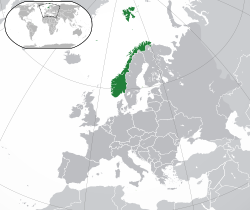In late July this summer, a lone gunman bombed a building in Norway's capitol Oslo, killing seven, then drove to an island where over 500 youth were attending a low key political youth wing rally for the nation's labor party. There, 23-year-old Anders Breivik systematically shot and killed nearly 70 individuals - most of them teenagers - many in the water trying to swim to safety.
Norway sits on the western edge of the Scandinavian peninsula
Come to be called the Utoeya massacre, the event rocked the normally quiet affluent nation of just five million, priding itself for a sophisticated, tolerant society. Questions and criticisms quickly surfaced regarding overlooked pockets of right wing extremists, a woefully slow and sparse police response that allowed the shooting to continue for over an hour, and whether lenient criminal laws would find the shooter eligible for release far sooner than the public mood would accept.
All of these introspections and debates are to be expected and needed as one aspect of a society's grief and recovery over such a violent loss. A followup article in the BBC today, however, is hopeful, in describing the healing during the past five months.
"Few here forget the sense of sadness and unity in the immediate aftermath: a pastoral service at Oslo's Domkirke cathedral attracted thousands; a rose parade in Oslo attended by so many that the scent of pink and red petals lingered in the air for days.
An overwhelming remembrance of roses in front of the Domkirke cathedral in the days after summer shooting
Cathedral clergy say during the first two or three weeks after the attacks more than one million people came inside the church, while between two and three million congregated outside. All this in a country where it is estimated that only 10% of all baptized Lutherans attend church regularly.
Click on image for full picture
For many secular Norwegians, roses in memorials were their way of expressing grief
The BBC article notes one personal interview, "The rose is a symbol of love," says Lisbeth Royneland whose 18-year-old daughter, Synne, died in the massacre. As an atheist Lisbeth found the rose parades more helpful than anything related to the church, but was glad of its support. How had she come to terms with grief of such epic proportions. Did she need to pray? "Not really. I was hoping to find her alive. It was so enormous, and so terrible an act that I didn't pray. I didn't. I wish I could."
On the other hand, Kristin Moen Saxegaard, a pastor from Ringerike, a county near Utoeya, was called to the Sundvolden hotel to counsel those who were waiting for news of their children. "The parents often asked 'where was my daughter?' and 'was she alone at that time?'. And then I could say, as the pastor, that she was not alone when all this happened." She said that many of them wanted her to pray on their behalf, wanting God to be with their children, whether they were alive or dead.
As Christmas is upon the world, and especially so in societies with a Judeo-Christian heritage, Norwegian believers find solace in the church and with others of faith. One teenager who was on the island but escaped the shooting, Marte Fjermestad, related how her faith kept her calm. Marte scrambled, then waited with a small group of other teenagers hiding in the woods until they were sure that the gunman had gone, in which time she says she felt a connection with God. "I'm a Christian, so I prayed a lot. At one point I was praying to God and Jesus and I just looked up and saw some branch on a tree and it was shaped like a heart. It felt like God was saying: 'calm down'."
16 year old Marte lighting a candle in a December service
Today, a simple stone memorial stands at the end of the dock leading to Utoyea island. There is a small brass heart attached to the stone with an engraved reflection, "If one man can show so much hate, just imagine how much love we can all show together."
Once again, Teatree's favorite Christmas hymn may be appropriate for this time of year,
(Henry Wadsworth Longfellow (1807-1882)
I Heard the Bells on Christmas Day
Their old familiar carols play,
And wild and sweet the words repeat
Of peace on earth, good will to men.
I thought how, as the day had come,
The belfries of all Christendom
Had rolled along the unbroken song
Of peace on earth, good will to men.
And in despair I bowed my head:
"There is no peace on earth," I said,
"For hate is strong and mocks the song
Of peace on earth, good will to men."
Then pealed the bells more loud and deep:
"God is not dead, nor doth he sleep;
The wrong shall fail, the right prevail,
With peace on earth, good will to men."
This is a big world, we happen to have been born into a dominant country, itself part of a prosperous and powerful Western civilization. We're "oversupplied" with news though it may not inform us well. "Six stories from seven continents" is a modest effort to remind ourselves there are snippets, events, and stories from all around the world to hear and learn from... that our awareness is incomplete, and life is breathtakingly more complex and wonderful than we usually imagine.
North Korea

The always bombastic and unpredictable North Koreans go hysterical again. This time the country is prepared to "go to war" with South Korea because that country is playing loudspeakers directed at North Korean territory. A headline from a UK paper reads, "More than 50 North Korea submarines 'leave their bases' as war talks with South continue "




No comments:
Post a Comment